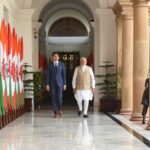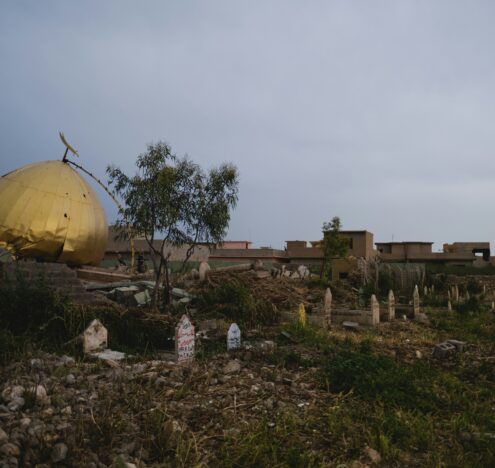Since the Sept. 11 attacks two decades ago, Americans have debated whether to scale down the US global military presence that followed the “Global War on Terror.” From US interventions in Afghanistan and Iraq to counterterrorism operations and partnerships with governments around the world, this debate has most recently been framed as whether or not the United States should end its “endless wars.”
If by “endless wars” we mean places where US forces are directly involved in kinetic counterterrorism operations, this is a critical debate to have. US forces conducted ground operations and/or air or drone strikes in 10 countries between 2018 and 2020, and the US has spent $6.4 trillion on the post-9/11 wars, according to the Costs of War Project.
But too often, in the media and in policy circles, it has been framed in starkly dichotomous terms, as an argument about whether or not to withdraw US forces from active engagements — with little attention paid to how. In other words, there has not been nearly enough discussion about what ending “endless wars” should actually look like — and how we can treat the people that we’re leaving behind with their full dignity and humanity.
The decision to end US military engagement isn’t enough to end an “endless war” that is already in motion — a consequence we saw when US forces left Iraq in 2011, in Yemen earlier this year, and in Afghanistan this week. Military occupations and interventions have failed to build the stable democracies that their proponents promised, but they still have complex knock-on effects, from empowering military groups with external support, to shifting the defense priorities of allies and neighboring countries, to remaking regional economic and humanitarian infrastructure. Some of these effects are inextricably linked to US intervention, while others would also have accompanied an alternative to a military-first policy. Academic and policy debates around ending “endless wars” have, by and large, failed to account for the far-reaching eco-systems generated by intervention; it appears that the Biden administration planning for the departure from Afghanistan made the same initial mistake.
There has not been nearly enough discussion about what ending “endless wars” should actually look like — and how we can treat the people that we’re leaving behind with their full dignity and humanity.
This is not an argument for keeping US forces deployed interminably, nor is it a nihilistic shrug that the United States can’t do anything in the face of these challenges. Rather, it’s a plea to end “endless wars” responsibly: by comprehensively planning for a range of scenarios, by managing the logistics of withdrawal competently and compassionately in the short term, and by investing in conflict prevention and peacebuilding in the long run.
Like the decision to intervene itself, withdrawing US forces will have significant and lasting effects on the balance of forces within a conflict and to the regional security architecture, as local and regional actors adjust to shifting incentives created by the US military presence. It will change the incentives that relevant actors face, leading to realignments that could potentially have cascading effects — a scenario we saw in Afghanistan over the past couple of weeks as provincial capitals fell to the Taliban far more quickly than many had anticipated.
US withdrawal will also have significant effects on ally and partner relationships. Policymakers will need to decide what we owe to allies and partners who are also involved in these conflicts, and what we can or ought to do to coordinate with allies and partners to maintain these relationships. And it will mean having a humanitarian plan in place that accounts for what the US can be expected to achieve and is transparent about the commitments that we are making. While there is still much we don’t know about whether and how the administration accounted for these possible cascading effects, pro-actively processing the visa backlog, to take one example, would have made the evacuation of Hamid Karzai International Airport less chaotic and alleviated some of the staggering human suffering that has ensued as a result of delays in the Special Immigrant Visa (SIV) process.
Ending endless wars responsibly must also mean putting more thought and resources into how the logistics of withdrawal are coordinated. This will mean having a plan in place to evacuate civilians, if necessary. It also means building a comprehensive plan to protect the forcibly displaced in advance. We should create and expedite an efficient visa process to allow people who worked alongside US forces, journalists, human rights advocates, and any others who might be vulnerable to resettle in the United States, and provide support and resources to regional countries who are able to host refugees. To do this well, we will need stronger, fully-staffed civilian capabilities — including strengthening and increasing funding to our humanitarian aid and resettlement organizations — to complement the Pentagon’s already-robust logistics capabilities.
In the longer term, it means deeply and substantively investing in preventing and ending conflict with diplomatic and development, rather than military, tools. This requires centering local peacebuilding efforts and making high-level peace processes more inclusive. It means building out our conflict prevention capabilities at home, while supporting multilateral peacebuilding and peacekeeping efforts. Most importantly, these investments in conflict prevention need to be sustained over the long run. Too often, we look for quick fixes to complex conflicts and rush to hold elections, rather than addressing issues like transitional justice and accountability head-on. And to build US diplomatic and development capacities, we must rectify the systematic under-funding of the State Department and USAID.
We need to put just as much thought into how we end military intervention as we do into whether we ought to end them at all. Ending US intervention is not enough to end “endless wars.”
Alexandra Stark is a Senior Researcher at New America and holds a PhD from Georgetown University. She is currently working on a book manuscript, Forgotten Wars: What intervention in Yemen’s civil war tells us about Middle East politics and the failures of US policy.





















